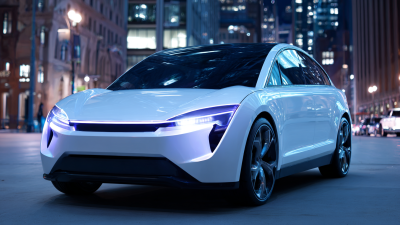As the world increasingly shifts towards sustainable transportation solutions, Phev Cars (Plug-in Hybrid Electric Vehicles) have emerged as a promising option for eco-conscious drivers. This innovative vehicle type combines the advantages of traditional gasoline engines with the efficiency of electric driving, offering a unique solution that enhances fuel economy while reducing emissions. However, despite their benefits, many consumers still possess reservations about the practicality and performance of Phev Cars. This blog will delve into the myriad advantages of adopting Phev Cars for eco-friendly driving, addressing common misconceptions and highlighting how these vehicles can contribute to a greener future. By understanding the potential of Phev Cars, we can unlock a more sustainable lifestyle without compromising on convenience or performance. Join us as we explore the challenges and triumphs of integrating Phev Cars into our daily lives and paving the way for an environmentally-friendly driving experience.

 Plug-in Hybrid Electric Vehicles (PHEVs) are rapidly gaining momentum as a sustainable transportation solution, thanks to their unique configuration that combines electric and traditional fuel systems. The benefits of PHEV cars extend beyond merely reducing carbon emissions; they offer an eco-friendly driving experience that caters to both efficiency and convenience. By utilizing electric power for short commutes, PHEVs allow drivers to significantly lower their fuel consumption and greenhouse gas emissions, making them a compelling choice for environmentally conscious consumers.
Plug-in Hybrid Electric Vehicles (PHEVs) are rapidly gaining momentum as a sustainable transportation solution, thanks to their unique configuration that combines electric and traditional fuel systems. The benefits of PHEV cars extend beyond merely reducing carbon emissions; they offer an eco-friendly driving experience that caters to both efficiency and convenience. By utilizing electric power for short commutes, PHEVs allow drivers to significantly lower their fuel consumption and greenhouse gas emissions, making them a compelling choice for environmentally conscious consumers.
In addition to environmental benefits, PHEVs provide flexibility that purely electric vehicles may lack. With the ability to switch between electric and gasoline power, drivers need not worry about range anxiety, making long trips more feasible. This adaptability not only promotes broader adoption of sustainable driving practices but also aligns with ongoing trends in the automotive industry, where manufacturers are shifting towards greener alternatives. Thus, the advantages of PHEV cars underscore a significant step towards a sustainable driving future, making them an attractive option for those looking to contribute to a healthier planet.
When considering a shift toward more eco-friendly driving experiences,
Plug-in Hybrid Electric Vehicles (PHEVs) stand out not only for their environmental benefits but also for the
substantial cost savings they provide. One of the most significant advantages of PHEVs lies in their ability to operate on
both electricity and gasoline. This dual-fuel system allows drivers to take advantage of cheaper electricity prices,
particularly during off-peak hours, significantly reducing overall fuel expenses.
Moreover, PHEVs often come equipped with advanced regenerative braking systems that convert kinetic energy into usable electric energy, promoting efficiency. By utilizing electric power for shorter daily commutes, drivers can reduce their reliance on gasoline, leading to further savings at the pump. As the prices of fossil fuels fluctuate, PHEVs ensure that drivers are less exposed to these variances, providing a more predictable and manageable fuel budget. With government incentives and rebates available for PHEV users, the initial investment can quickly pay off, making these vehicles not just a sustainable choice, but also a financially savvy one.
The rise of Plug-in Hybrid Electric Vehicles (PHEVs) marks a significant leap towards environmentally conscious transportation. With a dual powertrain that combines an electric motor and a gasoline engine, PHEVs are designed to minimize emissions, creating a cleaner driving experience. One of the most notable benefits of PHEVs is their ability to operate in electric-only mode for short distances, reducing the reliance on fossil fuels and drastically lowering greenhouse gas emissions.
In urban areas, where air quality is often compromised by vehicle exhaust, PHEVs can contribute substantially to cleaner air. By switching to electric power for daily commutes and errands, drivers help decrease local pollutants that can harm respiratory health and contribute to climate change. Furthermore, the regenerative braking systems in PHEVs not only improve energy efficiency but also reduce wear and tear on brakes, ultimately leading to a decrease in overall particulate matter released into the atmosphere.
Additionally, the adoption of PHEVs encourages a shift toward renewable energy sources. As more users charge their vehicles through solar or wind-powered systems, the overall environmental impact becomes even more positive. This synergy between electric vehicles and clean energy aligns perfectly with the global aim to lower emissions and protect our planet for future generations.
Plug-in Hybrid Electric Vehicles (PHEVs) represent a transformative shift in eco-friendly transportation. By seamlessly merging electric and gasoline power, PHEVs offer an exceptional level of versatility that appeals to a wide range of drivers. Unlike traditional electric vehicles that rely solely on battery power, PHEVs can switch to gasoline when needed, providing an extended driving range and alleviating range anxiety. This dual-power approach allows for efficient local commuting using electric power while still being capable of longer trips without the inconvenience of frequent charging stops.
Moreover, the adaptability of PHEVs contributes significantly to their environmental benefits. When operating in electric mode, they produce zero tailpipe emissions, substantially reducing the carbon footprint associated with daily driving. Drivers can enjoy longer journeys with the reassurance of traditional fuel backup, making these vehicles ideal for both urban environments and longer road trips. As the demand for sustainable driving solutions grows, PHEVs stand out as a practical choice, balancing the advantages of electric mobility with the reliability of gasoline engines. This combination ensures that eco-conscious drivers do not have to compromise on convenience or performance.
Plug-in Hybrid Electric Vehicles (PHEVs) are gaining traction as a viable option for eco-conscious drivers, thanks in part to the array of financial incentives and rebates available to owners. According to the U.S. Department of Energy, potential buyers of PHEVs may be eligible for federal tax credits up to $7,500, depending on the battery capacity. This significant financial perk not only lowers the upfront cost of the vehicle but also encourages a shift towards more sustainable driving habits. In addition to federal incentives, many states and local governments offer additional rebates and tax benefits, further reducing the cost for consumers looking to invest in green technology.
Moreover, as reported by the International Council on Clean Transportation, the demand for PHEVs has risen steadily, with sales surging over 80% in the last five years. This growth is inspired not just by environmental concerns but also by the attractive financial incentives that make owning a PHEV economically viable. Many utility companies provide additional benefits, such as lower electricity rates for charging during off-peak hours, further enhancing the financial appeal of these vehicles. As consumers become more aware of these benefits, the transition towards a more eco-friendly driving experience is likely to accelerate, positioning PHEVs as a cornerstone in sustainable transportation.
| Incentive Type | Description | Potential Savings | Eligibility Criteria |
|---|---|---|---|
| Federal Tax Credit | A credit available for purchasing qualifying PHEV vehicles. | Up to $7,500 | Must meet vehicle and battery capacity requirements. |
| State Tax Incentives | Additional discounts offered by individual states to promote electric vehicle use. | Varies by state ($500 - $5,000) | Depends on state laws and vehicle specifications. |
| HOV Lane Access | Permission to use High Occupancy Vehicle (HOV) lanes regardless of passenger count. | Time savings; potential reduction in commute times. | PHEV must be registered and meet certain standards. |
| Utility Company Rebates | Rebates offered for installing home charging stations or for the purchase of electric vehicles. | Up to $1,000 | Varies by utility provider and program availability. |
| Sales Tax Exemption | Exemption from state sales tax when purchasing eligible vehicles. | Potential savings of hundreds to thousands of dollars. | Subject to state regulations and vehicle qualifications. |
PHEV cars, or Plug-in Hybrid Electric Vehicles, offer a compelling solution for eco-friendly driving, blending the best of both electric and gasoline power. These vehicles not only promote sustainable driving through reduced fuel expenses but also contribute to a cleaner environment by lowering emissions, thereby improving air quality. The versatility of PHEVs allows drivers to switch seamlessly between electric and gasoline modes, making them ideal for various driving scenarios.
Moreover, PHEV owners can take advantage of various incentives and rebates, enhancing the financial benefits of their investment. With advanced technology and performance capabilities, these cars elevate the driving experience while prioritizing environmental impact. Choosing PHEV cars not only supports personal savings but also fosters a healthier planet, making them a wise choice for environmentally-conscious consumers.






